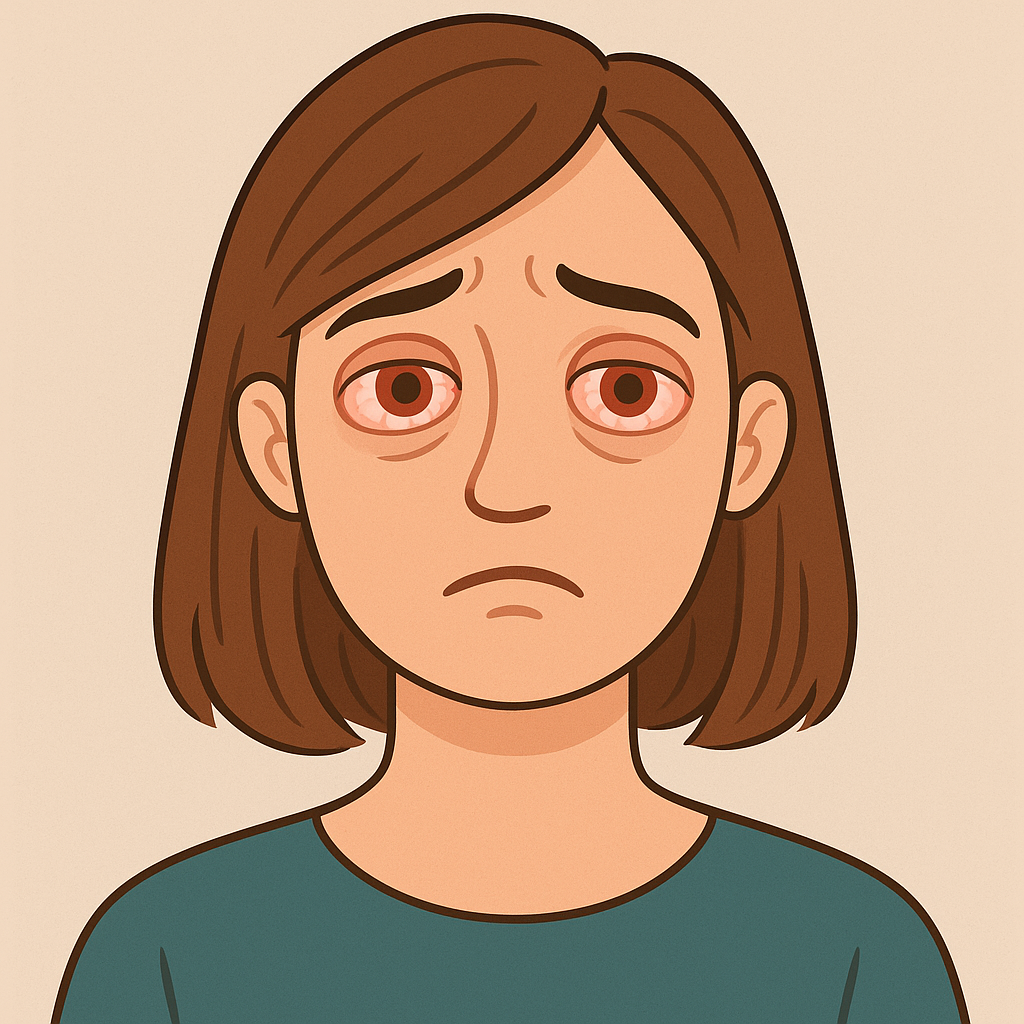Thyroid Eye Disease Treatment Options: A Comprehensive Guide


have already shared their stories
Lifestyle Modifications for Thyroid Eye Disease (TED)
Thyroid eye disease (TED), also known as Graves' ophthalmopathy, is an autoimmune disease often associated with Graves' disease and hyperthyroidism. But what is thyroid eye disease exactly? It's a condition that affects the eyes and surrounding tissues, causing inflammation and various symptoms. Before exploring advanced treatments for thyroid eye disease symptoms, basic lifestyle changes can help manage mild thyroid eye disease:
- Quit Smoking: Smoking worsens inflammation and can prolong the active phase of TED. Quitting is one of the most impactful steps you can take. In Germany, smoking cessation programs are widely available and can be accessed through your local healthcare provider or insurance.
- Eye Protection: Wearing sunglasses can reduce sensitivity to light, while using lubricating eye drops, artificial tears, or lubricating gels can alleviate dry eyes and irritation. At night, applying an eye ointment can help protect the eyes from dryness and eye irritation caused by incomplete eyelid closure, which is common in TED. These solutions are universally applicable and readily available at pharmacies in Germany.
- Selenium Supplements: For patients with low selenium levels, supplementation may reduce inflammation and improve mild symptoms. In Germany, selenium supplementation is commonly recommended for individuals with confirmed deficiencies. However, it is important to consult your healthcare provider before starting supplementation, as excessive selenium intake can have adverse effects.
- Head Position During Sleep: Sleeping with your upper body elevated (e.g., by using an extra pillow or an adjustable bed) can help reduce overnight swelling around the eyes and minimize morning puffiness. This simple adjustment can alleviate pressure by reducing fluid retention around the eyes and thereby improve comfort, especially for those experiencing thyroid puffy eyelids.
Medical Treatments for Thyroid Eye Disease
For more severe or persistent cases of Graves' disease eyes or hyperthyroidism eyes, medical interventions may be necessary. Here are the thyroid eye disease medication options, including their availability in Germany:
1. Corticosteroids
Corticosteroids, such as intravenous methylprednisolone or oral prednisone, are often used to reduce inflammation during the active phase of TED. In Germany, these are prescribed by specialists and may require monitoring for side effects such as weight gain, high blood pressure, and increased risk of infection.
2. Immunomodulatory and Biologic Therapies
If corticosteroids are insufficient or contraindicated, additional TED treatment options may include immunosuppressants and targeted biologics:
Immunosuppressants (e.g., Ciclosporin, Mycophenolate Mofetil): These drugs may be used in steroid-refractory cases to suppress immune activity and slow disease progression. Their use requires regular monitoring due to potential side effects such as kidney impairment and hypertension.
Teprotumumab (Tepezza): This groundbreaking monoclonal antibody, also known as teprotumumab-trbw, specifically targets the IGF-1 receptor involved in TED progression. Tepezza infusions have shown significant improvements in proptosis and double vision. While it has been FDA-approved in the U.S. since 2020, the availability of this Tepezza drug in Germany depends on European Medicines Agency (EMA) approval and national adoption policies.
3. Orbital Radiotherapy
Low-dose orbital radiotherapy may be considered in cases of moderate to severe TED that do not respond well to medication. This therapy helps reduce inflammation and prevent further tissue damage by targeting the orbital tissues. In Germany, orbital radiotherapy is available in specialized centers and is typically reserved for patients with persistent symptoms despite medical treatment. While generally well-tolerated, radiation therapy carries potential long-term risks, including fibrosis and cataract formation, which should be discussed with your healthcare provider.
Surgical Options for Thyroid Eye Disease
When medical therapies are insufficient or when TED causes significant vision changes, surgical intervention may be necessary. Germany has a robust healthcare infrastructure with skilled ophthalmologists and surgeons specializing in TED-related procedures.
1. Orbital Decompression Surgery
This procedure removes bone or fat from the eye socket to create more space, reducing eye bulging (proptosis) and pressure on the optic nerve. It is widely available in Germany, often performed in university hospitals or specialized eye clinics.
2. Strabismus Surgery
If TED leads to double vision, this eye muscle surgery can realign the eyes by adjusting the eye muscles. Strabismus surgery is common in Germany and covered by most insurance plans.
3. Eyelid Surgery
Eyelid retraction, a common symptom of TED, can be corrected with surgery to improve eyelid positioning and reduce eye exposure. This procedure is also available in Germany and is performed by specialized ophthalmoplastic surgeons.
Emerging Treatments and Research
New emerging treatments are currently undergoing clinical trials and may become available in the future:
- Veligrotug: An experimental drug has shown promising results in clinical trials. As of now, it may not yet be accessible in Germany, but keep an eye on EMA and clinical trial announcements.
- IBI311: This monoclonal antibody is under investigation for its potential to target IGF-1R and reduce inflammation in TED patients. Its availability in Germany will depend on the results of clinical trials and regulatory approval.
Choosing the Right Treatment
The choice of treatment for thyroid eye disease depends on factors such as:
- Severity of symptoms
- Stage of the disease (active or inactive)
- Overall health and preferences
In Germany, accessing specialized care may require a referral from your general practitioner (Hausarzt). Make sure to consult an ophthalmologist or endocrinologist who has experience with TED to explore the best options under the German healthcare system. It's important to note that thyroid eye disease symptoms in females may differ slightly from those in males, so personalized care is essential.
Final Thoughts on Thyroid Eye Disease Treatment Options
With advancements in both medical and surgical treatments, there is a wide range of thyroid eye disease treatment options available today. From lifestyle changes and medications like Tepezza to cutting-edge therapies such as Veligrotug, patients worldwide, including those in Germany, have more opportunities than ever to manage this condition effectively.
It's important to note that TED is often associated with Graves' disease and hyperthyroidism. Managing these underlying conditions with Graves' disease medication, such as anti-thyroid medicines or beta blockers, is crucial for overall treatment success. Regular monitoring of thyroid hormones and TSH levels is essential for proper disease management. Graves' disease diagnosis often involves a Graves' disease test to measure TSH levels and antibodies. Graves disease TSH levels are typically low, which helps in confirming the diagnosis.
If you or a loved one is dealing with TED, consult a healthcare provider to explore the best treatment options for your situation. Early intervention can make a significant difference in preserving vision and enhancing quality of life.
For those experiencing mild thyroid eye disease, simple measures like using artificial tears, wearing prisms for double vision, and making lifestyle adjustments can provide significant relief. However, for more severe cases, advanced treatments like Tepezza infusions or surgical interventions may be necessary.
It's worth noting that in some cases of Graves' disease, radioactive iodine therapy may be recommended to treat the underlying thyroid condition. However, this treatment should be carefully considered in patients with active TED, as it may exacerbate eye symptoms in some cases.
By staying informed about the latest developments in TED treatment and working closely with your healthcare team, you can effectively manage thyroid eye disease and maintain your eye health.

have already shared their stories







